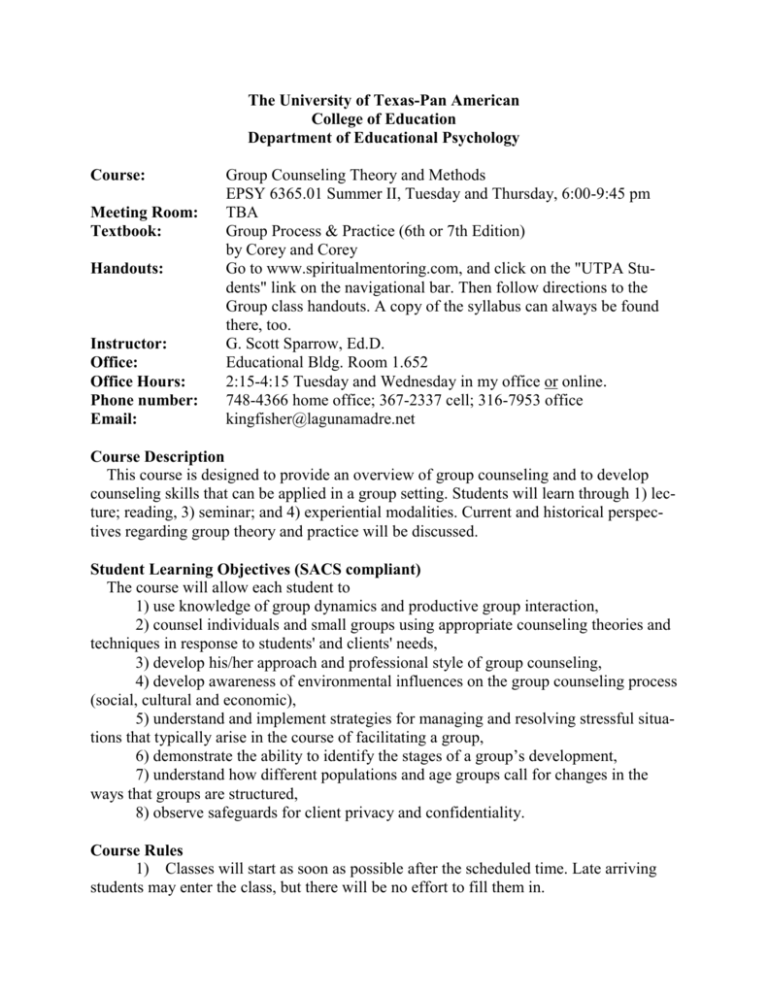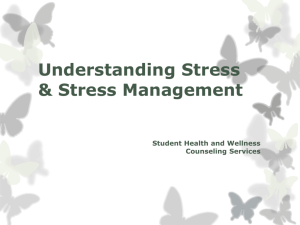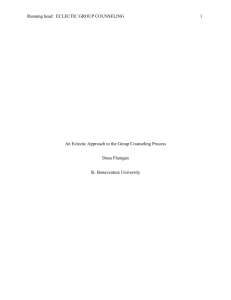The University of Texas-Pan American College of Education
advertisement

The University of Texas-Pan American College of Education Department of Educational Psychology Course: Meeting Room: Textbook: Handouts: Instructor: Office: Office Hours: Phone number: Email: Group Counseling Theory and Methods EPSY 6365.01 Summer II, Tuesday and Thursday, 6:00-9:45 pm TBA Group Process & Practice (6th or 7th Edition) by Corey and Corey Go to www.spiritualmentoring.com, and click on the "UTPA Students" link on the navigational bar. Then follow directions to the Group class handouts. A copy of the syllabus can always be found there, too. G. Scott Sparrow, Ed.D. Educational Bldg. Room 1.652 2:15-4:15 Tuesday and Wednesday in my office or online. 748-4366 home office; 367-2337 cell; 316-7953 office kingfisher@lagunamadre.net Course Description This course is designed to provide an overview of group counseling and to develop counseling skills that can be applied in a group setting. Students will learn through 1) lecture; reading, 3) seminar; and 4) experiential modalities. Current and historical perspectives regarding group theory and practice will be discussed. Student Learning Objectives (SACS compliant) The course will allow each student to 1) use knowledge of group dynamics and productive group interaction, 2) counsel individuals and small groups using appropriate counseling theories and techniques in response to students' and clients' needs, 3) develop his/her approach and professional style of group counseling, 4) develop awareness of environmental influences on the group counseling process (social, cultural and economic), 5) understand and implement strategies for managing and resolving stressful situations that typically arise in the course of facilitating a group, 6) demonstrate the ability to identify the stages of a group’s development, 7) understand how different populations and age groups call for changes in the ways that groups are structured, 8) observe safeguards for client privacy and confidentiality. Course Rules 1) Classes will start as soon as possible after the scheduled time. Late arriving students may enter the class, but there will be no effort to fill them in. 2) Class attendance is governed by the Handbook of Operating Procedures. For a more detailed description of UTPA policies on absences related to UTPA-related activities, or related to religious holidays, please refer to the HOP under Student and Student Life Policies, Section 5.2.4. For other absences, the following policy is observed in this class in accordance with the HOP: "The student is expected to attend all classes and laboratory sessions. It is the responsibility of the student to inform each instructor of absences. When, however, in the judgment of the instructor, a student has been absent to such a degree as to impair his or her status relative to credit for the course, the instructor may drop the student from the class with a grade of 'DP' or 'DF.'" Clearly, this policy leaves a lot up the professor in deciding what constitutes a level of absenteeism that is significant enough to impair your status relative to credit for this course. When it comes to this class, in particular, your attendance is crucial in order maintain the continuity of your small group experience. Please let me know ahead of time if you will not be able to attend a class. 3) Cellular phones must be turned off during class. 4) During lecture time, students should refrain from reading books related to other classes, doing homework for other classes, or keyboarding since these activities can be very distracting to other students. Accommodations If you have a documented disability that will make it difficult for you to carry out the work that I have outlined, and/or you need special assistance or accommodations due to your disability, please contact the Office of Services for Persons with Disabilities. Appropriate help will be arranged. Meeting Outline for Most of the Class Meetings Review. Each starting with the second meeting will begin with a review of student reaction papers (see below). Students will be expected to read one one to two paragraphs of their papers, but not the whole paper. It is up to you to decide how much to read. Content Presentation. Then I will deliver a presentation on the text reading, handouts, and parallel sources, including my experience as a group therapist. I will also describe various problems that arise in group counseling, as well as interventions/facilitations that can be used to resolve these incidents. Role Playing Period. During this segment of the class meeting, you will practice role playing scenarios that commonly arise in group counseling. You will be expected to serve as the leader in one or more of these role-playing activities, with my support and guidance. Small Group Period. Then, during the Small Group Period, each student will participate in an ongoing group that will provide a real-life group counseling experience, led on a rotating basis by its members, and overseen by me during the early stages. These groups will meet weekly during the final hour of our class meeting. Grade Breakdown 1) Reaction papers -- Pass/Fail worth 100 points. Beginning with the second meeting, each student will read from a one-page typed reaction paper concerning the previous class session. These reaction papers should not be a summary of events, but an expression of your feelings and thoughts pertaining to the previous class discussion, and group session. You do not have to read the entire paper, only that portion that you want to share. Please observe caution in speaking about your small group experiences. Speak about your work, not the work of your fellow members! You should refrain from mentioning specific other classmates by name, or speaking about them in ways that others could easily identify them. You will receive full credit for your reaction papers if you complete each reaction paper on time, and it contains sufficient detail to demonstrate a serious effort. I will give you credit only if you have your reaction paper at that time. There will be no exceptions made. 2) Online Quiz over first half of the course -- 100 points -- 25-30 multiple choice questions. 3) Online Quiz over second half of the course -- 100 points -- 25-30 multiple choice questions. 5) Readiness Paper -- 100 points. A paper (minimum of seven pages) typed in 12-point Times Roman font, double spaced, with one-inch margins -- in which you cover the following issues. Please separate each section, and label it according to the following breakdowns. a) Describe your customary "adaptive behaviors" that may stand in the way of your effectiveness as a group member and a counselor. You will learn what "adaptive behavior" means in this course. i. Is your adaptive behavior "reactive" or "compliant," or both? Again you will learn what this means. ii. What early experiences gave rise to it? Be specific. iii. Have you dealt with the people and circumstances in your life that gave rise to it? iv. What are you doing, or will do, to resolve this adaptive behavior? What will be the possible consequence of addressing it directly, or not addressing it directly? b) Describe at least one leadership strength that you possess -- that you have used during your group sessions, and how you intend to build on this strength. Cite an example of when it was used in your small group work. c) Describe at least one leadership weakness or limitation that you have discovered in your group sessions, and how you intend to remove or overcome this limitation. Cite one example of when it became evident in your small group experience. d) Describe a significant moment in your group experience -- either in the role as the leader or a member-- where you could have done something different than you did. What could you have done differently, and what might have been the outcome? d) Describe the most significant interpersonal experience that you have had in your group meetings, and how it has affected you since. Final Grade Determination Your grade will be determined by the total points that you earn. The points required for grades are as follows: Total Possible Points -- 400 points A --360-400 points B -- 320-359 points C -- 280-319 Class Schedule and Due Dates for Assignments will be available on the first day of class.










